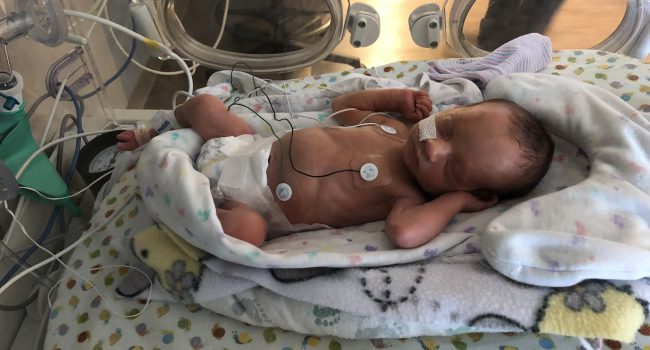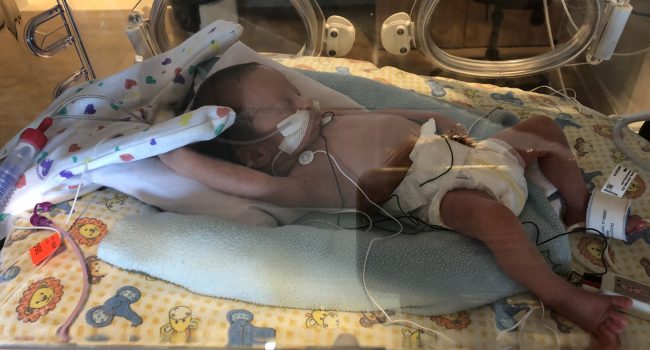
Dr. Peter Van Eerden is a maternal fetal medicine (MFM) specialist with expertise in high-risk pregnancies at Sanford Health in Fargo. His team of MFMs and pediatric specialists at Sanford is comprehensive and collaborative, equipped to treat most conditions. For complex situations that require fetoscopic laser surgery or open fetal surgery, Dr. Van Eerden refers patients to the Midwest Fetal Care Center (MWFCC), a collaboration between Children’s Minnesota and Allina Health. “It’s important that we refer patients to a center that is fetal-trained, sees a high volume of complex procedures, and delivers great outcomes for moms and babies,” said Dr. Van Eerden. “MWFCC checks all the boxes. They have the infrastructure to do surgical procedures that effectively treat my patients.”

What is TTTS?
Twin to twin transfusion syndrome (TTTS) is a condition that occurs only in monochorionic pregnancies when the blood flow between the babies becomes unbalanced, and one baby donates blood to the other. This causes the donor twin to become dehydrated and stop making urine, which results in a decrease in amniotic fluid. The recipient baby produces higher-than-normal amounts of urine, resulting in excess amniotic fluid. The donor twin experiences slower-than-normal growth, while the recipient twin is at risk of heart failure due to the extra volume of blood. Without intervention, the condition can be fatal for both twins.
Making the diagnosis: indications of TTTS
TTTS can develop rapidly, so moms carrying monochorionic twins should undergo frequent ultrasounds to evaluate amniotic fluid volumes. As he does with all of his monochorionic patients, Dr. Van Eerden performed ultrasounds on Kathy every week starting at 16 weeks. He monitored the babies’ growth, fluid and blood flow, using ultrasound imagery to specifically watch for:
- One baby having extra amniotic fluid and the other having significantly decreased amounts
- Abnormalities in blood flow patterns in the umbilical cord
- Abdominal pain or distension in the mother
- A rapid enlargement of the mother’s uterus — more quickly than is expected in pregnancy
What is TAPS?
Twin anemia polycythemia sequence (TAPS) is an imbalance in red blood cells and hemoglobin between the twins in the womb, caused by the joining of a few small caliber AV anastomoses. With TAPS, the donor twin is at risk for anemia and the recipient twin is at risk for polycythemia, both of which can lead to fetal loss.

A trusted partnership
Dr. Van Eerden’s patient, Kathy, was diagnosed with both twin to twin transfusion syndrome (TTTS) and twin anemia polycythemia sequence (TAPS). As Dr. Van Eerden monitored Kathy and her babies, he discussed her case with Dr. Saul Snowise, the director of the laser program at the MWFCC to determine the best time to refer Kathy for fetoscopic laser surgery.
Prevalence and treatment of TTTS
Monochorionic diamniotic twins occur at a rate of three to four in 1,000 live births. TTTS develops in about 10 to 15 percent of those pregnancies. The condition does not occur when twins are non-identical (fraternal).
As one of the highest volume treatment centers in the nation for TTTS, the Midwest Fetal Care Center offers multiple treatment options for the condition, depending upon the stage of TTTS, the gestational age of the babies at diagnosis, and the ultrasound findings at the time of presentation. In Kathy’s case, fetoscopic laser photocoagulation was performed by Dr. Snowise and the team at the MWFCC in Minneapolis. The minimally invasive procedure uses a laser to ablate the connecting blood vessels on the placenta that are contributing to the abnormal flow of blood between the babies.
The procedure was uncomplicated, and Kathy successfully delivered her babies, Cian and Rory, at 31 weeks under the care of Dr. Van Eerden in Fargo. She’s grateful for the partnership between Dr. Van Eerden and the team at the MWFCC. Their teamwork allowed her to receive fetal specialty care close to home in Fargo for the majority of her pregnancy, and fetal surgical care in the Twin Cities when it was needed. “From diagnosis through delivery and beyond, Dr. Van Eerden and Dr. Snowise are why I have two healthy boys today.”


Strong Outcomes
The MWFCC is the only advanced fetal care center in the Upper Midwest, and delivers exceptional outcomes for TTTS:
- 95% of procedures result in one or both twin(s) surviving
- 74% of procedures result in both twins surviving
“We are proud to work with talented maternal fetal medicine specialists like Dr. Van Eerden, stepping in to become an extension of their team when surgery is needed,” said Dr. Snowise. “Twenty years ago, TTTS killed most babies. We’ve come a long way in maximizing outcomes through new procedures and treatments.”
For more information about the Midwest Fetal Care Center, call (855) 693-3825 or visit ChildrensMN.org/MidwestFetalCareCenter.
